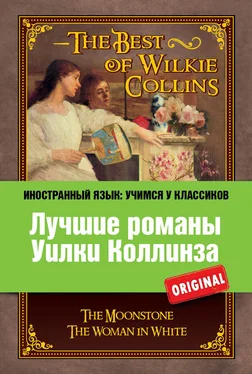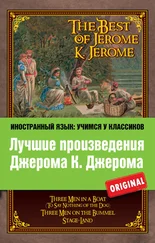His body was taken out of the Seine in the disguise which I have described, nothing being found on him which revealed his name, his rank, or his place of abode. The hand that struck him was never traced, and the circumstances under which he was killed were never discovered. I leave others to draw their own conclusions in reference to the secret of the assassination as I have drawn mine. When I have intimated that the foreigner with the scar was a member of the Brotherhood (admitted in Italy after Pesca’s departure from his native country), and when I have further added that the two cuts, in the form of a T, on the left arm of the dead man, signified the Italian word “Traditore [287],” and showed that justice had been done by the Brotherhood on a traitor, I have contributed all that I know towards elucidating the mystery of Count Fosco’s death.
The body was identified the day after I had seen it by means of an anonymous letter addressed to his wife. He was buried by Madame Fosco in the cemetery of Père la Chaise [288]. Fresh funeral wreaths continue to this day to be hung on the ornamental bronze railings round the tomb by the Countess’s own hand. She lives in the strictest retirement at Versailles [289]. Not long since she published a biography of her deceased husband. The work throws no light whatever on the name that was really his own or on the secret history of his life – it is almost entirely devoted to the praise of his domestic virtues, the assertion of his rare abilities, and the enumeration of the honours conferred on him. The circumstances attending his death are very briefly noticed, and are summed up on the last page in this sentence – ”His life was one long assertion of the rights of the aristocracy and the sacred principles of Order, and he died a martyr to his cause.”
The summer and autumn passed after my return from Paris, and brought no changes with them which need be noticed here. We lived so simply and quietly that the income which I was now steadily earning sufficed for all our wants.
In the February of the new year our first child was born – a son. My mother and sister and Mrs. Vesey were our guests at the little christening party, and Mrs. Clements was present to assist my wife on the same occasion. Marian was our boy’s godmother, and Pesca and Mr. Gilmore (the latter acting by proxy [290]) were his godfathers. I may add here that when Mr. Gilmore returned to us a year later he assisted the design of these pages, at my request, by writing the Narrative which appears early in the story under his name, and which, though first in order of precedence, was thus, in order of time, the last that I received.
The only event in our lives which now remains to be recorded, occurred when our little Walter was six months old.
At that time I was sent to Ireland to make sketches for certain forthcoming illustrations in the newspaper to which I was attached. I was away for nearly a fortnight, corresponding regularly with my wife and Marian, except during the last three days of my absence, when my movements were too uncertain to enable me to receive letters. I performed the latter part of my journey back at night, and when I reached home in the morning, to my utter astonishment there was no one to receive me. Laura and Marian and the child had left the house on the day before my return.
A note from my wife, which was given to me by the servant, only increased my surprise, by informing me that they had gone to Limmeridge House. Marian had prohibited any attempt at written explanations – I was entreated to follow them the moment I came back – complete enlightenment awaited me on my arrival in Cumberland – and I was forbidden to feel the slightest anxiety in the meantime. There the note ended. It was still early enough to catch the morning train. I reached Limmeridge House the same afternoon.
My wife and Marian were both upstairs. They had established themselves (by way of completing my amazement) in the little room which had been once assigned to me for a studio, when I was employed on Mr. Fairlie’s drawings. On the very chair which I used to occupy when I was at work Marian was sitting now, with the child industriously sucking his coral upon her lap – while Laura was standing by the well-remembered drawing-table which I had so often used, with the little album that I had filled for her in past times open under her hand.
“What in the name of heaven has brought you here?” I asked. “Does Mr. Fairlie know —?”
Marian suspended the question on my lips by telling me that Mr. Fairlie was dead. He had been struck by paralysis, and had never rallied after the shock. Mr. Kyrle had informed them of his death, and had advised them to proceed immediately to Limmeridge House.
Some dim perception of a great change dawned on my mind. Laura spoke before I had quite realised it. She stole close to me to enjoy the surprise which was still expressed in my face.
“My darling Walter,” she said, “must we really account for our boldness in coming here? I am afraid, love, I can only explain it by breaking through our rule, and referring to the past.”
“There is not the least necessity for doing anything of the kind,” said Marian. “We can be just as explicit, and much more interesting, by referring to the future.” She rose and held up the child kicking and crowing in her arms. “Do you know who this is, Walter?” she asked, with bright tears of happiness gathering in her eyes.
“Even MY bewilderment has its limits,” I replied. “I think I can still answer for knowing my own child.”
“Child!” she exclaimed, with all her easy gaiety of old times. “Do you talk in that familiar manner of one of the landed gentry of England? Are you aware, when I present this illustrious baby to your notice, in whose presence you stand? Evidently not! Let me make two eminent personages known to one another: Mr. Walter Hartright – THE HEIR OF LIMMERIDGE.”
So she spoke. In writing those last words, I have written all. The pen falters in my hand. The long, happy labour of many months is over. Marian was the good angel of our lives – let Marian end our Story.
Seringapatam– a town in southern India; the town got its name for the 12th century temple to the Hindu god Vishnu. In the 15th century it became the capital of the rajahs and sultans
Mohammedan– Muslim
Mahmud of Ghizni(998–1030) – sultan of Ghazna, the king-dom comprising the territory of present-day Afghanistan, most of Iran and northern India
Somnauth– Somnath, an ancient city in west-central India, now ruined; it is known for its temple of Shiva (Lord of the Moon)
Brahmins– members of the caste of Hindu priests
Benares– Varanasi, a sacred city of the Hindus in northern India on the left bank of the Ganges River
Vishnu– one of the main Hindu gods; Vishnu is associated with the Sun
Aurungzebe– Aurangzeb (1618–1707), emperor of India in 1658–1707, the last of the Mogul emperors
the Moguls– a Muslim dynasty that ruled India in the 16th–18th centuries
Brahma(h)– one of the major gods in Hinduism who created the earth and everything on it
Tippoo– Tippu (1750–1799), sultan of Mysore; he died in 1799 when his capital, Seringapatam, was stormed by the Brit-ish forces.
Читать дальше
Конец ознакомительного отрывка
Купить книгу












